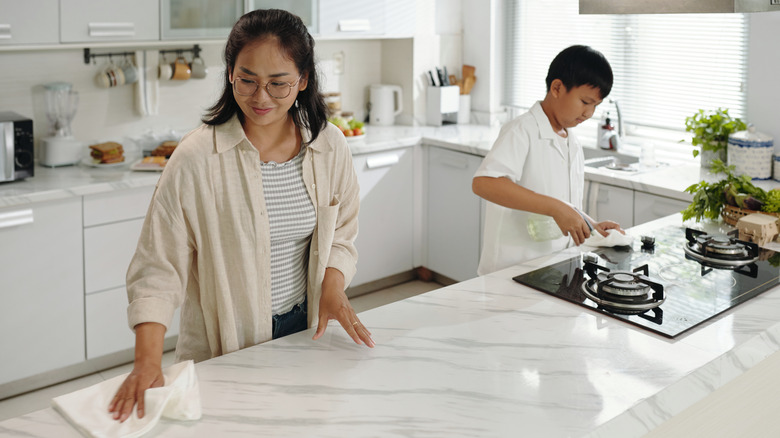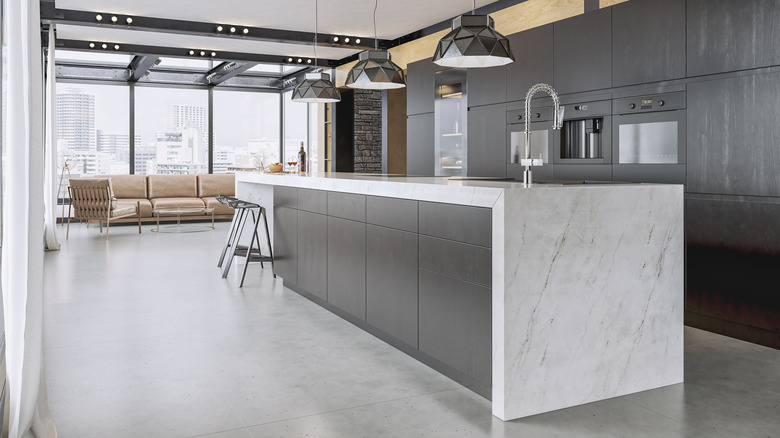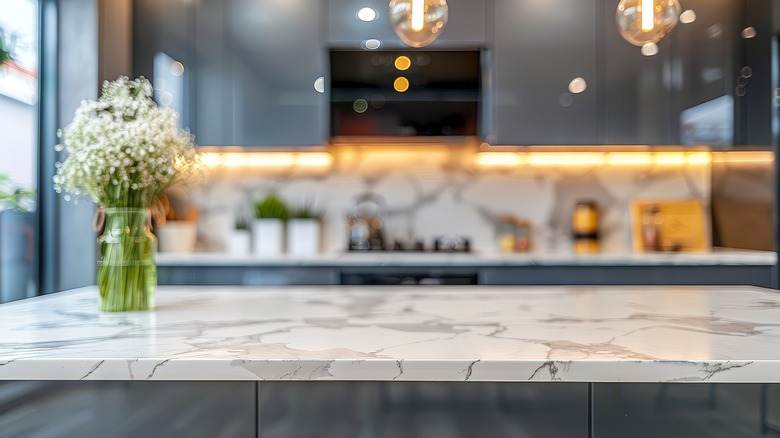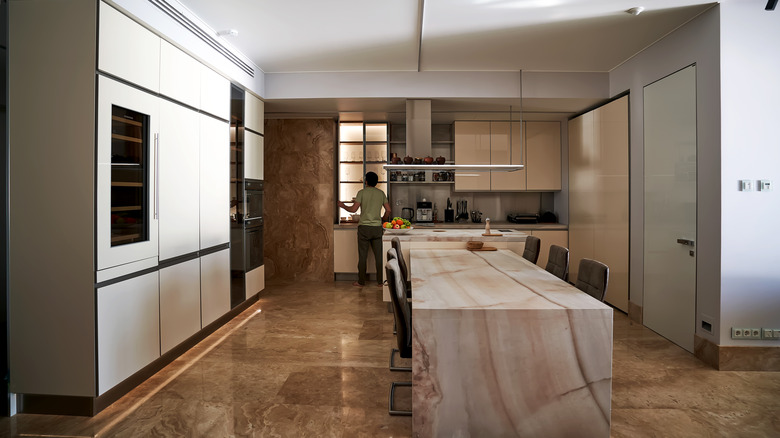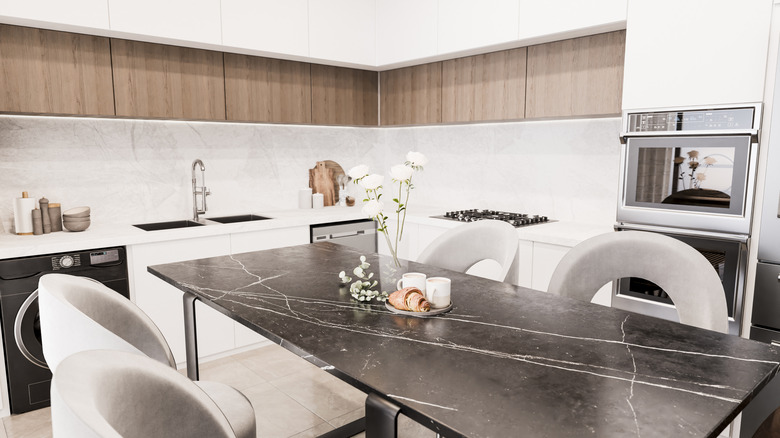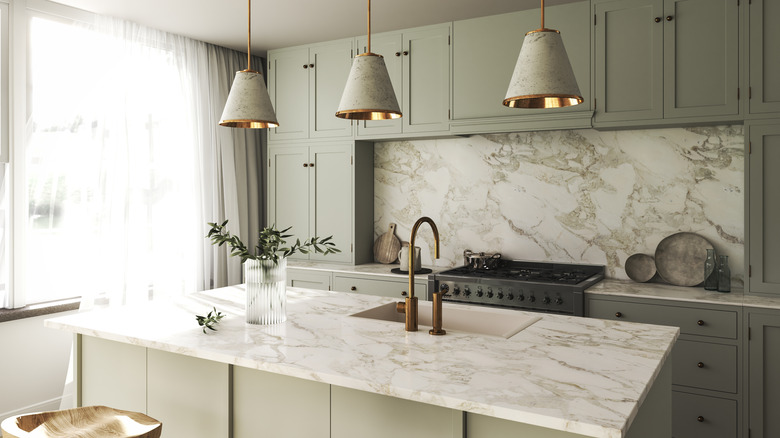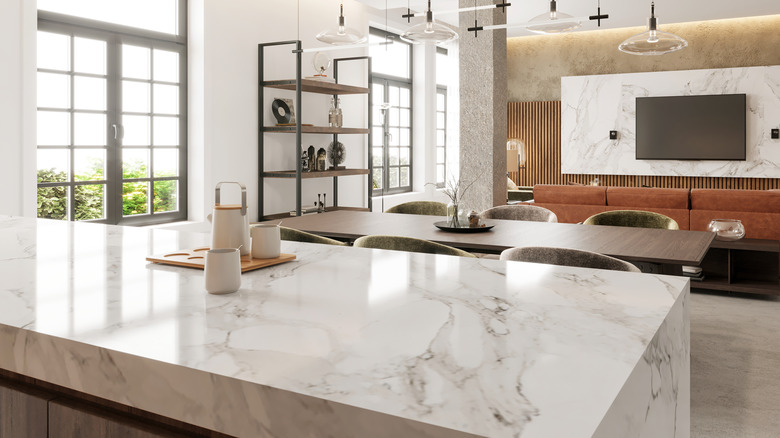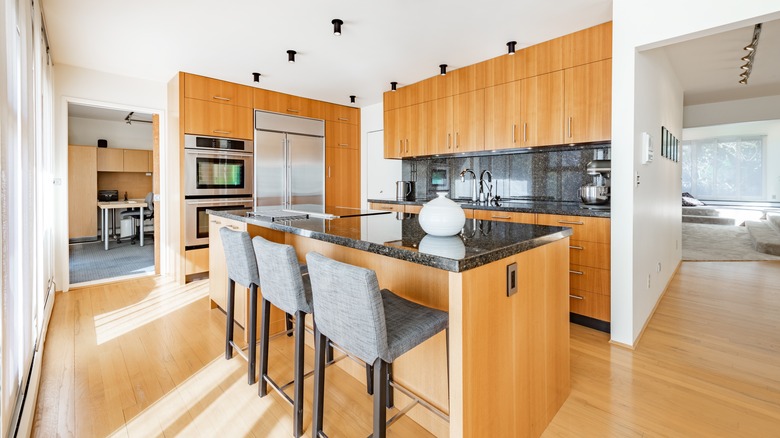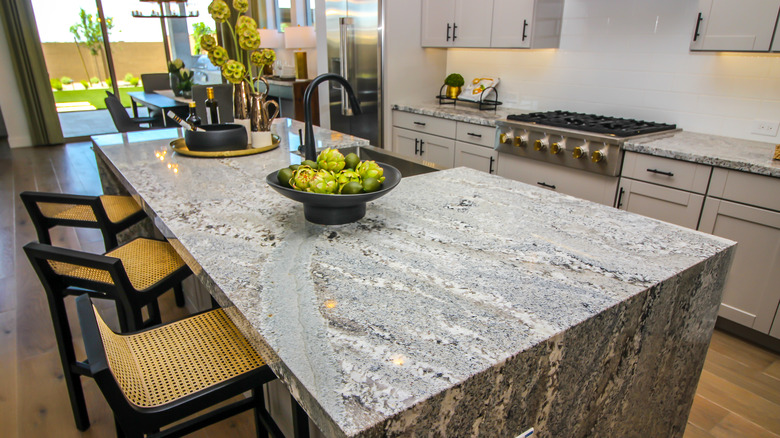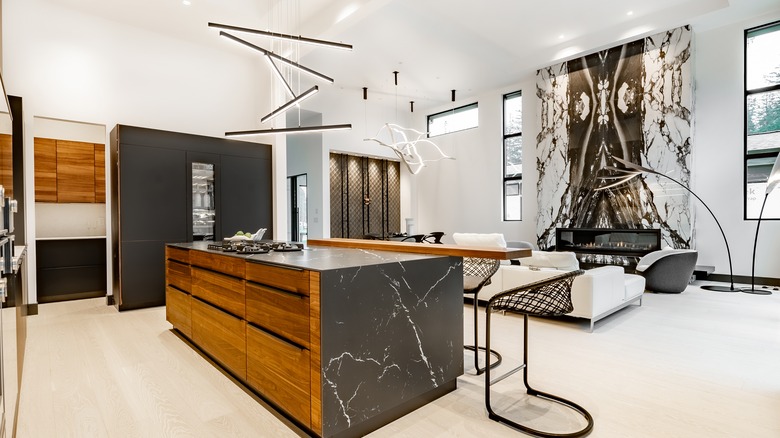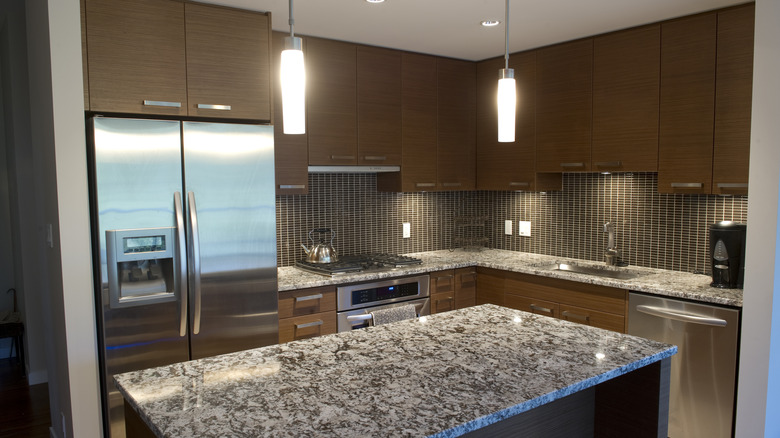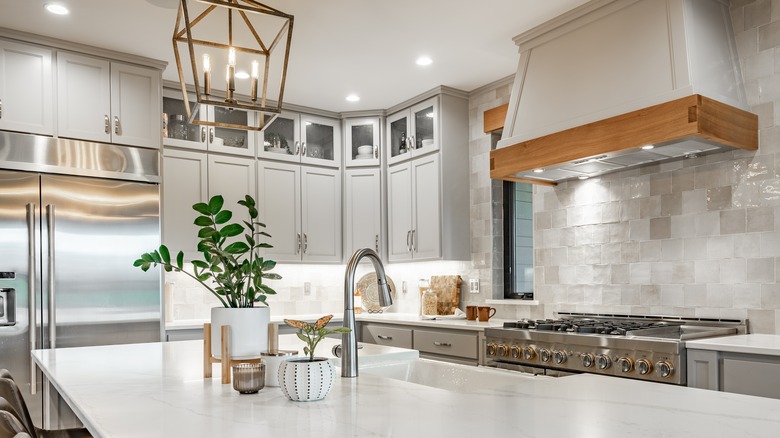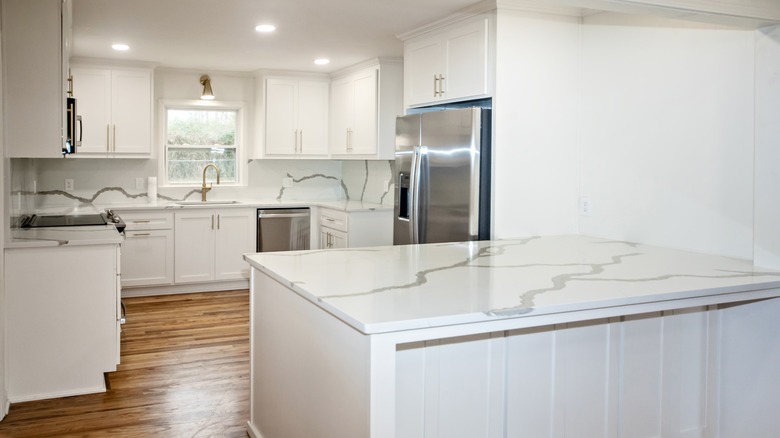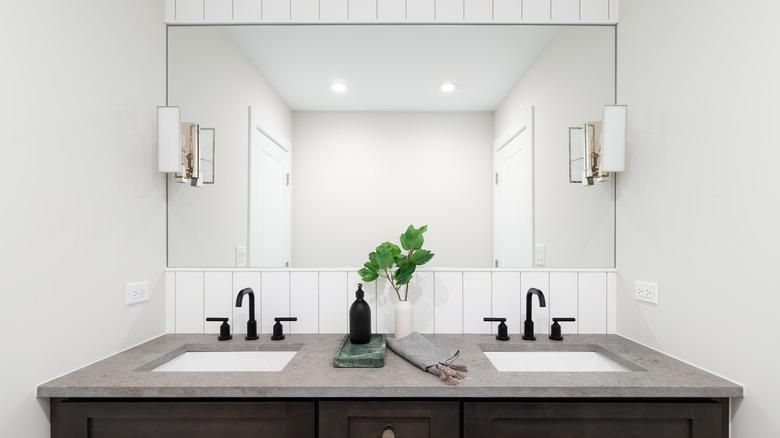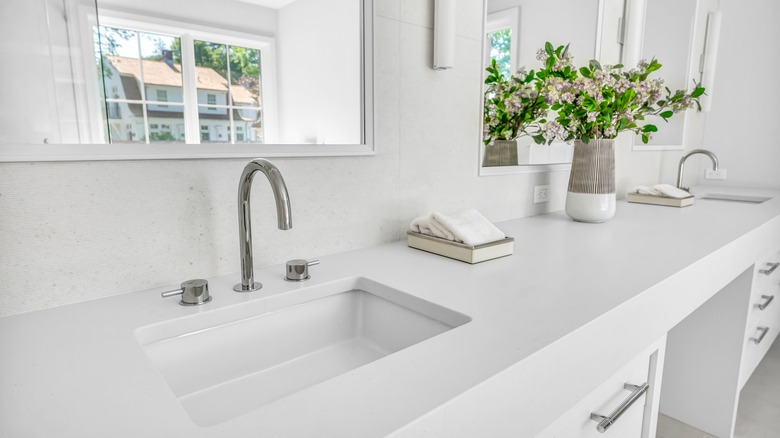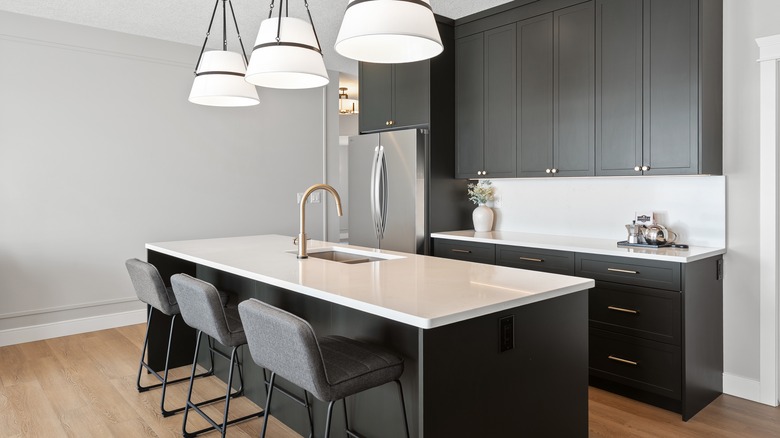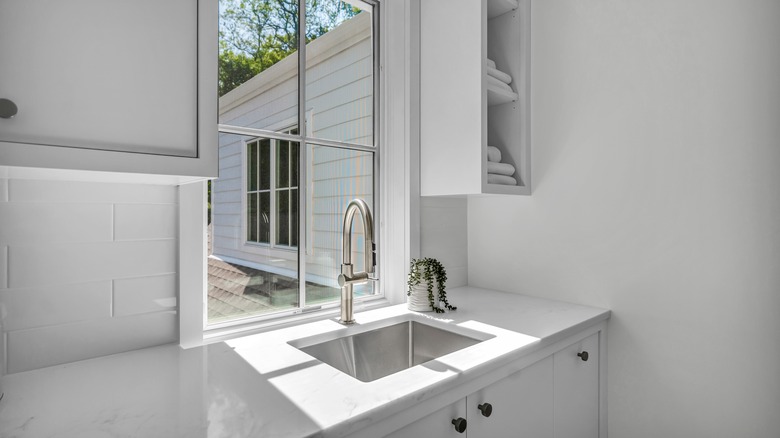16 Pros & Cons Of Marble, Quartz And Granite For Choosing The Right Countertops
We may receive a commission on purchases made from links.
How do you choose the right countertops for your kitchen? Well, the answer depends greatly on your priorities. If budget isn't an issue, you may be interested in the sleek, beautiful (and quite pricey) Calacatta marble. Or, if you're after a one-of-a-kind kitchen counter, you should consider granite, as each granite countertop is completely unique. If you're an experienced chef or baker and require practically heat-proof countertops, you might want to try quartz.
A few other considerations for your countertops include maintenance (some countertops require resealing) and durability (different materials may be prone to etching or staining, and some are more heat-resistant than others). Marble, granite, and quartz are some of the most popular countertop options, and they all have their pros and cons. Keep reading to learn about these countertop materials and decide which is best for you.
Pro: Marble offers a sophisticated look
Many would agree that marble screams luxury. The sophisticated, sleek look is definitely a pro of this countertop material. Every marble countertop is unique, and there are a variety of veining and colors that you can choose from. White marble is the most common, but black, grey, or even pink marble is also available. If aesthetics are a major priority for your kitchen countertop, marble definitely fits the bill.
Marble's beauty isn't a recent revelation. It was used in buildings in ancient Greece and Rome, and has been a popular material for sculptures as well. It has been revered for its natural beauty for a long time, so it's an amazing countertop choice. Marble definitely makes a statement; your countertops will absolutely turn heads if you choose this natural stone.
Con: Marble can be one of the more expensive stone countertop options, depending on the type
As with a number of countertop materials, the cost can vary depending on the specific type. Marble can be an extremely expensive countertop option, especially if you choose types like Calacatta or Statuario. There are other budget-friendly options, but it's definitely not on the same price level as a material like laminate.
Calacatta marble can cost $180 or more per square foot, and Statuario can range from $50 to $100. Why does Calacatta marble cost so much? It's because real Italian Calacatta originates from one quarry. Makrana marble ranges from $12 to $25 per square foot. This budget-friendly marble is still a beautiful option, but it is much more affordable than the rare marble types. Marble tiles can also be a consideration as an alternative to marble slab.
Con: Marble is prone to etching
Marble is a durable, excellent material choice for your kitchen countertop, but unfortunately, it may be prone to etching. Now, what is etching? It is actually a chemical reaction that occurs when something acidic sits on your countertop too long, leaving discoloration or rough texture behind. Why does this happen? Marble is actually a relatively soft material (it ranks a 4 on the Mohs scale, a scale that ranks minerals based on their hardness from 1 to 10), which is on the softer end.
Although this is considered a con of marble, there are ways to circumvent etching to some degree. It's a good idea to use cleaners that are not extremely acidic (avoid vinegar or lemon juice), use cutting boards and coasters, and be sure to clean up spills quickly. There are also ways to repair etching if it's not too seriously damaged. Etch remover polishing products, or something like these Dry Diamond Polishing Pads from SHDIATOOL, can help restore your marble countertops.
Pro: Some people prize the patina that marble develops over time
On the other hand, aged marble that has developed a patina is sometimes treasured. Patina is actually the term given to the historic appearance that marble gains over time. This includes etching and the effect that regular use has on the countertop. Some believe this gives marble more character, and it's actually a prized trait. Now, patina isn't to be confused with stains or deep scratches on your countertop.
The main reason marble changes as it ages is that it is a soft, porous stone. Unlike a polished, ultra-shiny material like quartz that always looks brand-new, patina gives marble variations in color and texture that bring a rustic nature to your kitchen. It brings a charm to your countertop that can't be replicated with other materials.
Con: Marble needs to be resealed regularly
One con of marble is that it does require some regular maintenance. It should be resealed semi-frequently, about every six to 12 months. But that time frame can vary. If you use your marble countertop every day, you may want to reseal it every other month. You can test to see if you need to reseal it by pouring water on the countertop and letting it sit for 30 minutes. If the countertop absorbs the water and a dark spot forms, it probably needs resealing.
If your goal is to reseal less often, there are a few common mistakes to avoid if you have marble countertops. Avoid acidic, abrasive cleaners, extreme temperature variations, and placing very heavy items on the counters. Another alternative to resealing is Jasmine Roth's secret to keeping marble countertops looking good as new — UV coating.
Pro: With proper care, marble can be a durable, long-lasting option
Even though marble has its pros and cons, it is definitely a long-lasting countertop material. A marble countertop can easily have a lifespan of 20 years. But if you're meticulous about caring for and maintaining the countertop, it can last up to 50 years or more. In order to keep your marble countertops in tip-top shape for 50 years, follow the tips listed above. The best way to clean marble surfaces is with a mild, neutral dish soap.
If you have any hesitancies with resealing your marble countertop yourself, consider calling the professionals, but it is possible to DIY. Simply clean off your counter and let it dry, then apply a sealer, like this Disinfecting Granite and Stone Daily Cleaner and Sealer Kit from Weiman, and wipe off any excess. You should let the countertop sit for at least 24 hours before using or setting items on it.
Pro: Each granite countertop is unique
Onto granite. Did you know? Every granite countertop is different. Granite is a natural stone, so no two pieces will be identical. There are also quite a few different types of granite, with varying colors and textures to choose from. The color of granite is actually determined by the concentration of different minerals that make up the stone. White granite is a popular option that contains a high concentration of quartz, and black granite is a unique and daring choice.
The unique, special look of granite definitely sets it apart from other countertop options. Exotic granite countertops like Golden Persa Granite or Magma Gold ensure your countertop is a show-stopper. The one-of-a-kind aspect of granite makes it an excellent option if you're going for a statement countertop. There are also a variety of granite countertop finishes that'll turn your kitchen into a rock-solid work of art, like polished, leathered, or even caressed.
Con: Granite may be prone to some staining
One con of granite countertops is that they can be prone to staining, especially lighter colored countertops like white or cream. Staining is even more common if the countertop is not sealed properly. As granite is a porous material, if a spill isn't cleaned up in a timely manner, staining can occur. Waiting to clean up spills is one of the things you should never do if you have granite countertops.
Even if you do have a stain on your granite countertop, all hope is not lost. If a neutral cleaner and water do not remove the stain, consider a stone poultice. Mix ¼ cup of baking soda with water (to create a paste consistency) and spread over the stain. Then cover with plastic wrap, and secure the plastic wrap to the counter with tape. You'll also want to poke a few holes in the plastic wrap. Leave for 24 to 48 hours, and repeat until the stain is gone.
Con: Granite also requires periodic resealing
Similar to marble, granite does require resealing. But, it is generally considered best practice to reseal annually (not as often as marble). To test if it's time to reseal your granite countertop, pour a few drops of water on the counter and leave for five minutes. If it is still there, your counter is fine; but if the water has absorbed into the counter, it's time to reseal.
A few things to note about granite resealing — one, color matters. Darker granite usually needs to be sealed less often than lighter granite. Second, some sealants last longer than others. High-end sealants use chemical technology, which makes them more long-lasting but also slightly more expensive. You can DIY seal a granite countertop just like with marble. Resealing is necessary to keep your granite countertops in pristine condition.
Pro: Granite offers great heat resilience compared most other countertop materials
One major pro about granite countertops is their heat resistance. Granite is actually formed when molten rock cools and solidifies. So, since granite is created under immense heat and pressure, it is extremely heat-resistant. You don't have to worry about damaging your granite countertops by placing a hot pot or pan on the surface. But, prolonged exposure to heat can damage granite countertops in the kitchen. Although granite itself is extremely durable, heat can affect the sealant on top of your granite countertop.
With that being said, granite is much more heat-resistant than other countertop materials. Quartz is heat-resistant as well, but definitely not heat-proof. Both stones require the use of trivets in order to avoid damage. If either is exposed to high temperatures for a long time, discoloration may occur.
Pro: Quartz is highly resistant to stains
Quartz is extremely stain-resistant. But it's not stain-proof; quartz can stain if it is not properly maintained. Compared to other natural stones, quartz has a low absorption rate and is less porous, which is beneficial in preventing discoloration.
It's generally easy to remove a stain from a quartz countertop. Liquids don't easily seep into quartz, so you can use warm soapy water or regular cleaning products to clean up spills. The best way to remove stains from your quartz countertops is with isopropyl alcohol. You can combat untreated, difficult spills that may not clear with just soap and water. Isopropyl alcohol can also be used as a disinfectant if diluted with water and a drop of soap.
Pro: Quartz countertops are virtually maintenance-free
Contrary to both marble and granite, quartz does not require any resealing or waxing. You don't have to worry about resealing your counters every few months in order to keep them in great shape. Quartz really only requires regular daily cleaning and limiting heat exposure (more on that next). If your top priority when choosing a countertop is something that is low-maintenance, quartz is definitely the best option.
It's a good idea to disinfect your countertop daily to limit germs and keep it shiny. Clean regularly with a damp cloth or just wipe down to dispose of any crumbs. You can also use a quartz stone cleaner, like this Quartz Countertop Cleaner and Polish by Weiman, to easily maintain your quartz countertop.
Con: Quartz is the most susceptible to heat damage out of the three
Even though quartz has its fair share of good qualities, it's not without any faults. Quartz is heat-resistant, but can definitely be damaged by very high heat. How much heat can quartz countertops take? Well, quartz can handle temperatures below 300 degrees Fahrenheit, but burn marks or discoloration can occur beyond that. You'll definitely want to be careful when placing hot items on your quartz countertops.
In order to protect your quartz countertop from heat damage, you should use trivets or oven mitts whenever possible. These Silicone Trivet Mats from Walfos can help protect your counters. Avoid putting hot pots and pans directly on the counter. If you don't have something to set your hot dishes on (like a hot pad), you should let your dish cool before setting it directly on the countertop.
Pro: Quartz comes in a vast range of popular looks
When you think of quartz, chances are you picture a clean, white countertop. But there is actually a wide variety of colors of quartz. Black quartz offers a bold, statement piece, while pink quartz is a unique and unlikely choice. The beautiful 4023 Topus Concrete by Caesarstone is another unique quartz color option, offering an interesting industrial look. It's a stunning quartz countertop color that will complete your kitchen renovation.
Even though there is a range of quartz color options, white quartz is a classic for a reason. It offers a clean, sleek, modern look to your kitchen. Plus, if you choose white quartz, you can go bold with cabinets or paint. Blue-gray or cool green are gorgeous cabinet colors that pair well with quartz countertops. In order to pick the best kitchen paint color to pair with your quartz countertops, consider the tone of your countertop, and choose a color in the right family.
Con: You might still be able to tell quartz apart from non-engineered alternatives
Quartz countertops are made of engineered stone, so they may not look exactly like their natural stone counterparts. There are a few things that may give it away, like repeating patterns. Natural stone often includes erratic patterns and looks different in every area. Engineered stone may have a uniform color or consistency, which sets it apart from natural stone. If having your countertops look just like natural stone is very important to you, it might be a good idea to go with marble or granite. But, man-made quartz is a great countertop alternative and often can't be spotted by a non-expert eye.
With that being said, advancements in engineered quartz are quickly emerging, making man-made quartz appear hyper-realistic. Another thing to consider about man-made quartz is that it has a high carbon footprint. Quartzite is an emerging kitchen countertop option that is more environmentally friendly.
Pro: Quartz countertops come with some of the longest warranties
One great perk of quartz countertops is the warranty. Some natural stone countertops come with an installation or limited warranty. But many quartz countertops come with a warranty from the manufacturer as well. These can be long-term warranties that protect against any manufacturer's issues.
In many cases, quartz warranties can range from 15 to 25 years; some even offer lifetime warranties. Some granite countertops have warranties that last 10 years, and marble warranties can be even shorter. The length of warranties can greatly vary between companies, but as marble is a natural stone that is softer than man-made materials (like engineered quartz), the warranties may not be as extensive.
